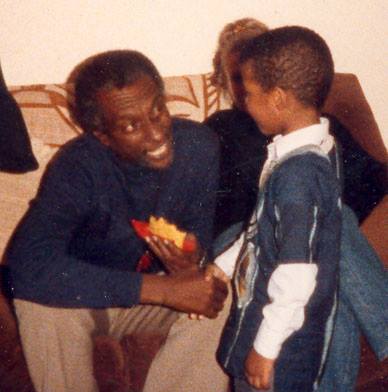Last week, to celebrate the start of Black History Month, I posted one of my most treasured pictures on social media: A picture of me and my parents at our home in South Jersey with civil rights leader Kwame Ture (aka Stokely Carmichael).

Kwame Ture once said: “What the liberal really wants is to bring about change which will not in any way endanger his position.”
This quote makes me think about the flurry of activity we saw last year from well-intentioned leaders to affirm that black lives matter and demonstrate that they are trying to bring about change.
But far too many of the actions we saw were sporadic and symbolic. The moves made were safe, cheap, and did little to shift power and positioning.
As Black History Month is here, this is a perfect time to commit to taking actions (big and small) that build black power, celebrate black excellence, and value black voices.
Here are six things leaders who are serious about black empowerment can do during Black History Month (and beyond):
1. #DoTheWork – Show you care by putting in the work to understand the rich legacy of black excellence, innovation, resistance, and perseverance. Study up on the beauty and brilliance of black people as well as the systems that have plundered and undercut black potential. There are an abundance of reading lists (see here and here), podcast lists (see here and here), movie/documentary lists (see here and here) anyone can start with to #DoTheWork.
2. #GetProximate – Don’t just read and talk about black empowerment. Take the time to build deep connections to the black community that are not transactional. We started The Proximity Project to help leaders do just that. You can register for an upcoming cohort here.
3. #CheckYourCulture – Last year, black folks watched as so many white organizational leaders made statements about their support for black lives while those same leaders have fostered organizational cultures that alienate and harm people of color. Take some time during Black History Month to read up on white supremacy culture and start addressing it in your organization. Don’t be the emperor with no clothes. Find ways to get to the truth about any ways your culture is anti-Black.
4. #LetUsBeGreat – Black history isn’t a thing of the past. There are black people all around you who are making history now or are poised to do something historic with the right support. While folks are effusive now about Amanda Gorman or Stacey Abrams, there are Josh McCraes, Anthony Mortons, and Hasana Parkers near you that you could help springboard into their greatness. I promise there are black writers, creators, entrepreneurs, technologists, etc in your organization who are being ignored, doubted, and marginalized. When we talk about black history lets not forget that there are always folks who end up on the wrong side of it.

5. #SpendBlack – You don’t have to be MacKenzie Scott to invest deeply in black-founded and led institutions. Just take a look at the businesses you patronize and the nonprofits that get the bulk of your philanthropic dollars. How many of them are black-founded or black-led? When your organization is looking for consultants, contractors, or vendors, how often do they work with black businesses? As I said last year: “Give your money early and often….Make multi-year commitments and recurring donations…..Give to us like you give to the white-led organizations that typically take the top spots on your list of charitable contributions.” TeenSHARP is a great place to invest and you can find other black-led nonprofits at Give Blck. And don’t forget how you spend your social capital! If you’re affluent and/or influential, don’t just join boards of organizations with status. Give your time to a small black business or nonprofit organization.
6. #StopHoarding – When I get opportunities or special invitations, I make a point to see if some of our TeenSHARP students or parents can join me. When I’m interviewed by the media for a story, I regularly connect the journalist with one of my students (like this article that features a few TeenSHARPies). If you’re looking for ways to support the black community, stop hoarding opportunities. When you’re invited to that next elite opportunity or event, try giving up your spot to a deserving black leader or creating an opportunity to have them join you. Don’t just accept that fancy invitation or appointment and lament the fact that a diverse group wasn’t selected. Do something sacrificial!
Let’s make this Black History Month one of substantial reflection and action.
If you have other recommend actions leaders should take to support black empowerment or examples of what you’re doing in your organization, please share them in the comments below.




Thanks for sharing Atnre!! I agree with your list of things Blacks could do to empower themselves, but some things are easier said than done. In 2019, Blacks in Delaware had a 5.3-billion-dollar economy. Furthermore, we have the power “to be” politically influential (meaning that in Delaware, we are not there yet). However, having “power’ and not knowing how to use that “power” makes you “powerless.” Part of the problem with the Black community is everybody wants to be the leader (I call it the Martin Luther King Syndrome), but nobody wants to be the “workers.” To make your list operational, our community needs a lecture about the “division of labor.” BTW, I met Ture twice, once when he was Stokely and again when he was Kwame (lol). Also, I have written an opinion piece titled “The History of Blacks’ Struggle for Inclusion in Delaware’s Public Education System” that I plan to submit to the News Journal. Let’s hope they print it; if not, there are other outlets.